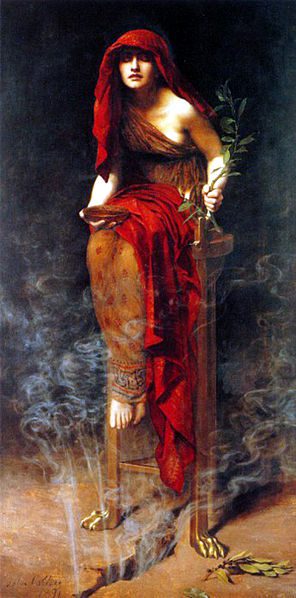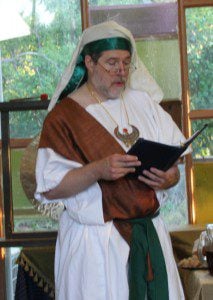
I wear many religious hats and fill many religious roles. One of them is priest. I occasionally talk about being a priest of Cernunnos and a priest of Danu, and I’m ordained as a priest in the Universal Gnostic Fellowship.
If you’ve read Under the Ancient Oaks for a while, you might get the idea I’m also a priest of Morrigan. I’ve probably written more about Morrigan than any other deity. I’ve made offerings to Her, made requests of Her and received Her blessings. I’ve delivered messages for Her, I’ve led rituals in Her honor, and I’ve participated in the initiation of one of Her priestesses. I pray to Her every night.
But I am not Her priest.
Our mainstream culture has two primary ideas about priesthood, flowing from the two major strands of Christianity, which is still the dominant religion in the West. The Catholic model says there are some things only a priest can do: according to the Catholic Encyclopedia “by his ordination a priest is invested with powers rather than with rights.” The Protestant model says that while the clergy has certain rights and responsibilities, any Christian can approach their God about anything. In particular, no intermediary is needed to forgive sins. Both of these ideas influence Pagan thinking about priesthood but neither is adequate.
You can find devotees of various deities going back into the 19th century (and maybe earlier – this isn’t a historical thesis), and in Gerald Gardner’s original Book of Shadows (dated 1949) the first degree initiate is proclaimed “Priestess and Witch of the Gods.” That’s another (rather Protestant) concept, but it’s not the same as being a sworn priest or priestess of a particular God or Goddess.
In her recent essay on Women in Religious Leadership, Niki Whiting pointed out that “Priest/ess is a skill that may or may not be necessary for one’s tradition!” Last year, Jason Mankey wrote this excellent piece on what it means to be a High Priestess in a Wiccan setting. One of these days I’m going to clean up an essay on “what is a priest?” I did for my ordination studies and post it here.
For now, and speaking as a devotional polytheist, let me simply say that priesthood is defined not only by what a priest does but also by the nature and structure of the relationship between the priest and the God.
Our differing examples of priesthood (Catholic, Protestant, Wiccan) create confusion for some people coming into devotional polytheism from our wider culture, or even from other forms of Paganism. I hear many people say they feel like they should be a priest, or that if they don’t have a patron deity there must be something wrong with them.
I’m a proponent of forming and maintaining strong reciprocal relationships with Gods, and with ancestors and other spirits. But you don’t have to be a priest to pour a libation. You don’t have to be a priest to tell the stories of a Goddess. You don’t have to be a priest to make a request, or to pay your debts if that request is granted. You don’t have to be a priest to hear the call of a God and to respond.

You don’t even have to be a priest to fill the role of a priest in a ritual. Every Summer Solstice for the past ten years I’ve helped lead a temple ritual in honor of the Neteru, the Gods of ancient Egypt. Most years, none of the participants have been priests of any of the Egyptian deities. Based on the results of and responses from these rituals, I’m pretty sure They don’t mind. For reasons known only to Them, They have not claimed any of us as a priest.
When I began working with Cernunnos and later with Danu, the call was early and clear: “be My priest.” I took vows to Them. When I read those vows now, they seem simple and unsophisticated… which is appropriate, given my understanding of Them at the time. (I still wouldn’t call my understanding of the Gods “sophisticated” but at least now I have a clue as to how much I don’t know.) I have obligations to Them and They have given me a geis – a minor thing, but it’s important to remember it. There was no explicitly stated time frame for my service, but the expectation was – and is – that this relationship will continue for the rest of this life.
When I began working with heavily with Morrigan, I assumed She would also call me to be Her priest. That call has never come.
For a long time that bothered me. I honored Her, I did good work for Her, and I spread Her message of sovereignty. Why was that not good enough to be a priest of the Lady of Sovereignty?
Eventually the answer came. The Battle Raven wants warriors, and I am no warrior.
I’m a Druid: a bard, a seer, a counselor, at times even a healer. I can support allies with invocations and blessings and I can oppose enemies with satires and imprecations. If it comes down to it I can fight, but not well and certainly not enthusiastically (I trust you understand fighting means more than physical combat).
I am what I am. Not everyone can be a warrior. Not everyone can be a priest of Morrigan.
If She has called you and you are not a warrior, that’s between you and Her. Like all the Gods, She calls who She calls. For me, Her priesthood and warriorship go hand in hand – accepting one means accepting both… and trying to become something I’m not.
My debts to Morrigan were squared some time ago. Since then, She’s been less active in my life… at least in part because the deities who did call me to their priesthood have had work for me to do. But I think – no, I am certain – I haven’t seen the last of the Great Queen.
I’ll continue to make offerings to Her, lead rituals in Her honor, tell Her stories, and spread the message of sovereignty. I’ll continue to honor Her in my nightly prayers, and I’ll continue to listen for Her call.
Even though I’m not Her priest.
















